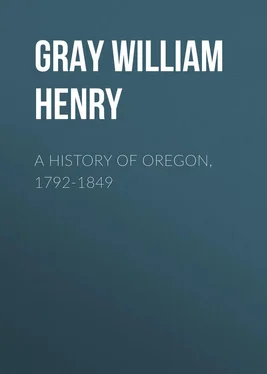William Gray - A History of Oregon, 1792-1849
Здесь есть возможность читать онлайн «William Gray - A History of Oregon, 1792-1849» — ознакомительный отрывок электронной книги совершенно бесплатно, а после прочтения отрывка купить полную версию. В некоторых случаях можно слушать аудио, скачать через торрент в формате fb2 и присутствует краткое содержание. Жанр: literature_19, foreign_antique, foreign_prose, Историческая проза, на английском языке. Описание произведения, (предисловие) а так же отзывы посетителей доступны на портале библиотеки ЛибКат.
- Название:A History of Oregon, 1792-1849
- Автор:
- Жанр:
- Год:неизвестен
- ISBN:нет данных
- Рейтинг книги:5 / 5. Голосов: 1
-
Избранное:Добавить в избранное
- Отзывы:
-
Ваша оценка:
- 100
- 1
- 2
- 3
- 4
- 5
A History of Oregon, 1792-1849: краткое содержание, описание и аннотация
Предлагаем к чтению аннотацию, описание, краткое содержание или предисловие (зависит от того, что написал сам автор книги «A History of Oregon, 1792-1849»). Если вы не нашли необходимую информацию о книге — напишите в комментариях, мы постараемся отыскать её.
A History of Oregon, 1792-1849 — читать онлайн ознакомительный отрывок
Ниже представлен текст книги, разбитый по страницам. Система сохранения места последней прочитанной страницы, позволяет с удобством читать онлайн бесплатно книгу «A History of Oregon, 1792-1849», без необходимости каждый раз заново искать на чём Вы остановились. Поставьте закладку, и сможете в любой момент перейти на страницу, на которой закончили чтение.
Интервал:
Закладка:
Mr. Astor says: “The plan by me adopted was such as must materially have affected the interests of the Northwest and Hudson’s Bay companies, and it was easy to be foreseen that they would employ every means to counteract my operations, and which, as my impression, I stated to the executive of your department as early as February, 1813.” This hatred of Americans had been so assiduously impressed upon the minds of the Indians, that one of their own vessels arriving in the river, being cast away on Sand Island, all on board were murdered by the Indians, who mistook them for Americans. The company sent a vessel from Vancouver (to which place they had removed their stores and principal depot) to punish the Indians, who had secured most of the wrecked property. The vessel came down and sent shell and grapeshot into the Indian village, destroying men, women, and children, landed their men and took such of their goods as they could find, having gained satisfactory evidence of the murder of the crew of the ship.
This view of the policy and practice of this Northwest and Hudson’s Bay Company, is further sustained by the inquiries which Mr. Keith felt it incumbent on him to make of Mr. Provost, on the restoration of Astoria to the Americans by the British authorities.
Mr. Keith was anxious to learn the extent of the rights of his company to remain and trade in the country. It would seem, from the whole history of these companies, that they felt their rights in the country to be but temporary, that they were trespassers upon American interests, and shaped all their arrangements accordingly.
It is an admitted historical fact that, while the Northwest Fur Company of Montreal was extending its trade across the Rocky Mountains and supplanting the American Pacific Fur Company of Mr. Astor, the Hudson’s Bay Company, with the assistance of Lord Selkirk’s Red River settlement, was cutting off their communication with these western establishments, and that, in consequence of this Red River interference with their trade, a deadly feud sprang up between the rival companies, in which both parties enlisted all the men and Indians over whom they had any influence, and frequently met in drunken and deadly strife, till they had quite destroyed all profits in their trade, and rendered the Indians hostile alike to friend and foe of the white race. So that, in 1821, the British Parliament was compelled to notice their proceedings, and, on the 2d of July, 1821, in an act bearing date as above, says of them: —
“Whereas, the competition in the fur trade between the governor and company of adventurers of England trading into Hudson’s Bay, and certain associations of persons trading under the name of the Northwest Company of Montreal, has been found, for some years past, to be productive of great inconvenience and loss, not only to the said company and association, but to the said trade in general, and also of great injury to the native Indians , and of other persons subjects of his Majesty ; and whereas, the animosities and feuds arising from such competition have also, for some years past, kept the interior of America, to the northward and westward of the provinces of Upper and Lower Canada, and of the Territories of the United States of America , in a state of continual disturbance ; and whereas, many breaches of the peace and violence extending to the loss of lives and considerable destruction of property have continually occurred therein,” etc. (See Greenhow’s History of Oregon, p. 467.)
The broad policy of British fur traders is here stated in plain language by their own government in a manner not to be mistaken. Their influence upon the Indians was injurious. Their policy toward each other was war and destruction to all opponents. The life and property of an opposing trader must not come in competition with the profits of their trade with Indians in any country.
How absurd it is for our government to spend millions of dollars to form treaties with Indians who are constantly visited by these foreign Indian traders and teachers, emissaries of a foreign power, who never breathed an honest breath or spoke a truthful word! Feeble and insignificant as they were, from 1813 to 1821 the whole Indian country of North America fell under their blighting and withering influence. Divided as they were, they were able to crush all honest competition, and combine in deadly combat against their own countrymen for the supremacy of the Indian trade. Have they lost their power and influence by uniting the elements of opposition in one vast fur monopoly? Nay, verily, as we shall see.
To gain a correct understanding of the foreign policy relative to the western portion of our country, it will be necessary to refer to the early history of the two fur companies, and trace their connection with France and England, which, notwithstanding the English government had given up the country to France in 1696 in the treaty of Ryswick, and no reservation was made on account of the Hudson’s Bay Company – as they did Oregon to the United States in the treaty of Ghent, in 1815, and made no reservation on account of the Northwest Fur Company – still the Hudson’s Bay Company held on to a single post, called Albany, on the southwest part of James Bay, for twenty-six years, as the Northwest and Hudson’s Bay fur companies did to Astoria and Oregon for forty-nine years.
In the wording of the treaty of Utrecht, in 1714, in which the country was given back to England by France, there is one proviso that is not to be overlooked, viz.: “It is, however, provided, that it may be entirely free for the company of Quebec, and all others the subjects of the most Christian king whatsoever, to go, by land or by sea, whithersoever they please, out of the lands of the said bay, together with all their goods, merchandise, arms, and effects, of what nature or condition soever, except such things as are above reserved in this article,” etc., the exceptions referring to forts, cannon, and permanent war materials.
This French stipulation in the treaty of Utrecht, in 1714, is repeated by the English diplomatist upon the Americans, in the third article of the treaty of June 15, 1846, forming the basis of the claim urged against our government in the treaty of 1864.
In the treaty stipulations between France and England in 1714, the commercial rights of the French company of Quebec were secured to them. From that time forward, the aggressive and oppressive policy of the British Hudson’s Bay Company was brought into collision, not only with the French Northwest Fur Company, but with the United States and all American fur companies and missionary and commercial enterprises coming within their fur-trade influence.
It will be remembered that the Hudson’s Bay Company, who claim their existence and privileges from the charter of Charles II., as early as 1670, had, in forty-four years’ time, only established (as Mr. Fitzgerald says) “four or five insignificant forts on the shores of Hudson’s Bay to carry on a trade in furs with those Indians who resorted thither;” while the French, for many years previous, had carried on an active trade with the Indians, and had explored the country and extended their posts up to the shores of the Saskatchewan, and over the Rocky Mountains, on to the waters of the Columbia. The French carried on the traffic by way of the St. Lawrence and the lakes to Fort William, on Lake Superior, and through the Lake of the Woods into Lake Winnipeg, or further south along the plains, crossing the course of the Red River; this being the direct and only line of posts kept up by the French Northwest Company, by which their food, goods, and furs were transported. The Hudson’s Bay Company carried theirs by way of Hudson’s Straits, around the coast of Labrador. In order to destroy and cut off as much as possible the trade of this Northwest Company, Lord Selkirk, in 1811-12, became a shareholder, and was allowed to claim, through the directors of the company, sixteen thousand square miles of territory in the Red River country, for the professed purpose of colonization.
Читать дальшеИнтервал:
Закладка:
Похожие книги на «A History of Oregon, 1792-1849»
Представляем Вашему вниманию похожие книги на «A History of Oregon, 1792-1849» списком для выбора. Мы отобрали схожую по названию и смыслу литературу в надежде предоставить читателям больше вариантов отыскать новые, интересные, ещё непрочитанные произведения.
Обсуждение, отзывы о книге «A History of Oregon, 1792-1849» и просто собственные мнения читателей. Оставьте ваши комментарии, напишите, что Вы думаете о произведении, его смысле или главных героях. Укажите что конкретно понравилось, а что нет, и почему Вы так считаете.












